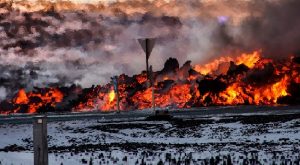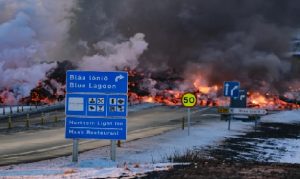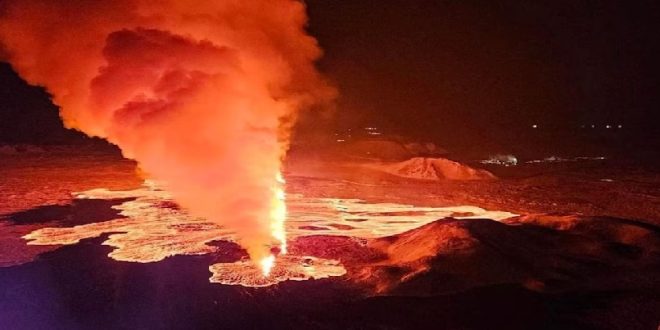10-02-2024
GRINDAVIK, ICELAND: A third volcanic eruption occurred on Thursday on the southwestern peninsula of Reykjanes in Iceland, the Business Recorder reported.
 This is the third volcano eruption since December 2023 in the peninsula.
This is the third volcano eruption since December 2023 in the peninsula.
On Thursday, the third volcanic explosion to strike the region since December began on the Reykjanes peninsula in southwest Iceland, according to authorities.
Live video showed blazing lava seeping out from a crack and illuminating the night sky into a column of smoke.
According to a statement by the Icelandic Meteorological Office (IMO), “At 5:30 this morning, intense small earthquake activity began northeast of Sylingarfell. About 30 minutes later, an eruption began in the same area.”
According to the initial assessment made during a Coast Guard fly-past, the fissure measured roughly three kilometres (1.86 miles) in length, according to the IMO.
It occurred in the same area as two previous eruptions, the first on December 18 and the second on January 14 near the fishing village of Grindavik, which had been evacuated.
With more than 30 active volcano systems, Iceland has more than any other country in Europe.
It straddles the Mid-Atlantic Ridge, a crack in the ocean floor separating the Eurasian and North American tectonic plates.
 Until March 2021, the Reykjanes peninsula had not experienced an eruption for eight centuries.
Until March 2021, the Reykjanes peninsula had not experienced an eruption for eight centuries.
Fresh eruptions occurred in August 2022 and July and December 2023, leading volcanologists to say it was probably the start of a new era of activity in the region.
Hundreds of small earthquakes had been measured in the area since last Friday, capped by a burst of intense seismic activity about a half-hour before the latest eruption began.
Dramatic video from Iceland’s coast guard shows fountains of lava soaring more than 165 feet into the darkened skies. A plume of vapor rose about 1½ miles above the volcano.
This is the third eruption since December of a volcanic system on the Reykjanes Peninsula, which is home to Keflavik, Iceland’s main airport. There was no disruption reported to the airport on Thursday.
Iceland, which sits above a volcanic hot spot in the North Atlantic, averages an eruption every four to five years. The most disruptive in recent times was the 2010 eruption of the Eyjafjallajokull volcano, which spewed huge clouds of ash into the atmosphere and led to widespread airspace closures over Europe.
Grindavik, about 30 miles southwest of Iceland’s capital, Reykjavik, was evacuated in November when the Svartsengi volcanic system awakened after almost 800 years with a series of earthquakes that opened large cracks in the earth between the town and Sylingarfell, a small mountain to the north. (Int’l News Desk)
 Pressmediaofindia
Pressmediaofindia




